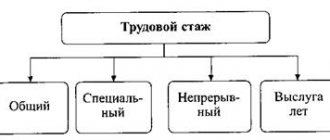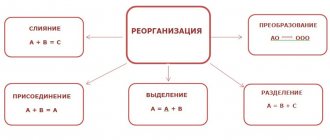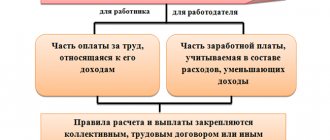Last modified: January 2021
Any company or entrepreneur is not insured against the risk of bankruptcy. As a result of such a sad event, a situation arises where the organization’s assets are not enough to cover its existing debts. And how wages will be paid in the event of bankruptcy of an enterprise is determined by various circumstances, including the persistence and energy of the employees themselves. At the same time, hired personnel do not always know what can be done to receive due payments in cases where the employer may soon cease to exist.
The procedure and timing of payment of debt on current wages to employees in the event of bankruptcy of an enterprise
The payment procedure can be divided into several stages, depending on at what stage the bankruptcy procedure occurs.
The procedure and terms for payment of debts by a bankrupt enterprise:
- After introducing the observation stage, at the initial stage of bankruptcy, the employer must calculate wages and all due payments.
- Then the manager must pay all current payments, out of sequence, but after paying the legal costs of the bankruptcy procedure and the agreed remuneration to the insolvency administrator.
Note that if financial management lies with the manager, then he distributes wages and pays them to employees.
As a rule, a salary arrears repayment schedule is drawn up.
- At the stage of liquidation of the organization, and this is 2 months before the final closure, the manager must inform all employees in writing about the upcoming dismissal.
- If an employee quits at this stage, his salary and compensation must be immediately calculated and paid 2 months in advance. This is stated in Article 178 of the Labor Code of the Russian Federation.
- The manager must also inform employees about their salary payments. The information must be entered into the register of creditors.
- Next, the registered debt is paid in the second order. If there are not enough funds to settle payments with second-priority creditors, then the available amount will be distributed among them in proportion to the size of the debt.
This is the procedure for paying off the debt of a bankrupt enterprise.
Please note that claims for ongoing debt payments will not be entered into the register.
What you need to do to get back wages
After declaring an enterprise bankrupt, the employee must send a request to the temporary or bankruptcy manager to repay the salary debt.
The following should be attached to the application:
- certificate of the amount of debt;
- and a copy of the employment contract.
The same requirement should be sent to the SRO of arbitration managers, the permission that the manager has, in order to further confirm his requirements. This needs to be done quickly. If the arbitration manager violates the rights of an employee, he must apply to the arbitration court.
Sequence of salary payment, indexation of payments
The law establishes the procedure for making payments. As we wrote above, a queue will be approved, according to which the employees will be paid the money they are entitled to.
Let's look at how the order is established:
- First of all, arrears of wages and the amount for severance pay are subject to payment. The total amount cannot exceed RUB 30,000.
- Then the remaining salary is distributed among employees, which exceeds RUB 30,000.
- Next, other employee payments are paid.
Please note that employees holding management positions at the enterprise will be partially assigned to the third stage of paying off current debt.
Payments will be made only after the remaining employees have been paid the minimum wage and other compensation.
There are payments that the company is obliged to pay out of turn - that is, before all payments to employees.
These include:
- Legal costs.
- Payment to the arbitration manager.
Also, priority is given to workers who have been harmed by the enterprise to their health or life. Payments will be made only on the basis of court decisions .
After them, the employer must pay back wages and other amounts to his subordinates.
In accordance with Article 134 of the Labor Code of the Russian Federation, the employer is obliged to increase wages in real terms, that is, index them, taking into account the consumer price growth index . As a rule, indexation should be specified in the collective agreement.
If there is no collective agreement, then indexation is unlikely to occur.
Indexation can be done annually, quarterly or monthly.
Salaries must be calculated with indexation indicators, which are published monthly by the FSSS bodies.
What is the situation with a citizen’s salary during debt restructuring?
The court and financial manager have control over the debtor’s money even at the stage of debt restructuring. But this control is less strict.
During restructuring, the debtor has the right to open a special bank account and place money on it, but the volume of transactions on the account should not exceed 50,000 rubles per month. This is stated in clause 5.1. Article 213.11 of the Law “On Bankruptcy”. Transactions in excess of the established limit require the written consent of the financial manager.
Upon request, the arbitration court may increase the maximum amount of funds in a special account.
List of documents for collecting wage debts and payments in case of bankruptcy of an organization
The employee must contact his immediate supervisor after he, in turn, notifies of the liquidation of the company, and inform him of his desire to receive a settlement.
The employee will have two options:
- He can quit and receive allotted money for the next 2 months, the amount of which will be calculated according to the minimum wage. Then you will need to write a letter of resignation.
- He may not quit, work until the enterprise closes - and receive all payments in order of priority.
The employee only needs a personal statement with a request to make calculations and pay compensation and other amounts. An application for salary is not required - it will be paid to the employee without a written request.
Important: After dismissal, the employee must be given a work book! Lawyers recommend checking the dismissal record immediately upon receipt.
A note must be made that the company has been liquidated.
FAQ
Question No. 1 The company declared itself bankrupt. What benefits are employees entitled to?
Answer: A bankrupt enterprise must pay employees wages for the time worked, severance pay in the amount of one average monthly salary, compensation in the amount of average monthly earnings for dismissal within less than two months after receiving the notice.
Question No. 2 What payments are due to a woman who is on maternity leave?
Answer: The amount of severance pay for employees on maternity leave is calculated based on the amount of wages before going on maternity leave.
Along with the work record book and the dismissal order, the employer is obliged to issue, on the day of dismissal, a certificate of the amount of earnings for the two calendar years preceding the year of termination of work or the year of application for a certificate of the amount of earnings, and the current calendar year for which insurance premiums were calculated. Rate the quality of the article . Your opinion is important to us:
The procedure for recognizing the invalidity of transactions in bankruptcy proceedings
All transactions made by a bankrupt company or other persons at its expense can be declared invalid.
In the example under consideration, suspicious actions regarding the conclusion of employment contracts were committed after the Company’s bankruptcy petition was accepted, that is, after May 13, 2015.
In Art. 61.2 of Law No. 127-FZ specifies the grounds leading to the invalidity of a transaction:
- the transaction was concluded at any time during the year before the bankruptcy petition was accepted, or after its acceptance;
- the counter-obligation of the counterparty does not correspond to the obligation of the second party;
- the price and terms of the contract are much worse for a bankrupt enterprise than they could be under ordinary civil legal relations.
The inequality of obligations is expressed primarily in the fact that the debtor gives more than he receives. For example, in a transaction, property is transferred that is worth much more than the purchase price established in the contract.
It is possible to recognize that a transaction is illegal only if there is evidence on the following points:
- the purpose of the transaction was to cause harm to creditors;
- after its conclusion, the specified goal is achieved;
- the second party to the contract guessed about the true purpose of the transaction or had the opportunity to find out about it.
If at least one of the points is not proven, then the transaction cannot be considered invalid.
The amount of harm caused to creditors is expressed in how much, as a result of a particular transaction, the debtor’s property has decreased and the volume of claims against it has increased. Damage may be caused by a transaction, as a result of which the creditors of a bankrupt enterprise cannot claim at the expense of its property what they were entitled to before the transaction was completed.
Consideration of the case by the RF Armed Forces
Having considered the cassation appeal of citizen M. against previously adopted court decisions, the panel of the RF Supreme Court announced its position on this matter. Its essence was that the rules on challenging the debtor's transactions, prescribed in the bankruptcy legislation, do not mean that the bankruptcy of the employing organization should limit the rights of employees to receive all guarantees in accordance with the current Labor Code. Such guarantees include indexation of wages, as well as payment of bonuses for performing additional work (Article 151 of the Labor Code of the Russian Federation).
According to the Supreme Court of the Russian Federation, the lower courts unlawfully avoided assessing the arguments of employee M. about the nature of the additional payments made to him. The citizen himself stated that the salary increase was aimed at compensating for inflation and additional payment for increasing the volume of work. In addition, this employee did not hold a management position.
As a result, all three previously adopted judicial acts were canceled , and the case was sent for a new trial. The court, which was supposed to take up this case, was recommended to look into the organization of the payment system of the bankrupt organization and check the bonuses issued to citizen M. for the equivalence of the employer's and employee's counter-provisions.
➡️ Don't forget to subscribe to our TG channel. We conduct surveys there and publish important legal news.
How to determine the unequal value of a transaction
According to the rules of the Arbitration Procedure Code of the Russian Federation, the bankruptcy trustee is obliged to prove that the transaction was unequal. In accordance with the documents available to the court, it followed that there were indeed close family relationships between the parties to the transaction.
But, as the court concluded, interest in the transaction among relatives alone is not enough to confidently talk about reducing the bankruptcy estate of the Company. It is necessary to prove that real harm was caused.
During the trial, the bankruptcy trustee did not provide the judge with evidence that Metelkin S.A. knew about the poor state of affairs in the company, and also did not prove that as a result of his performance of his labor functions in his positions, harm was caused to the creditors of the Company. All allegations that the Respondent does not have the necessary knowledge to perform the work of a deputy director, that he improperly performed the functions assigned to him, were unfounded.
The defendant documented that he performed work related to the positions he held. They were provided with reports, diagrams, a business plan, as well as other documented results of his activities. The bankruptcy trustee did not object to the documents presented by the Defendant.
Thus, the Defendant actually performed the work of his position, for which he received the salary assigned to him.
In accordance with the Unified State Register of Legal Entities, the Company was classified as a small business entity. Therefore, the bankruptcy trustee, justifying the amount of the overpayment, took as a basis data on the average salary in Moscow in 2015 among small enterprises (19.5 thousand rubles), as well as information on the average monthly salary in Moscow as a whole for all enterprises (42 ,3 thousand rubles).
The board indicated that the minimum wage is a guaranteed level of remuneration, the observance of which is monitored by the state.
Labor legislation does not prohibit the inclusion in an employment contract of additional conditions that improve the employee’s situation. Salary is a reward for work, which depends on professional qualities, level of education, and complexity of the work performed.
In accordance with the law, the employer has the exclusive right to set any wage, but not lower than that guaranteed by the state.
Thus, the appeal agreed with all the conclusions of the lower court and found no grounds for re-evaluating the arguments presented.
For a company in bankruptcy, challenging completed transactions is not the best scenario for the development of events. Such disputes take a lot of effort and time. And the result may be completely different from what the bankruptcy trustee expected.
Therefore, an enterprise needs to carefully approach the execution of transactions, check the authority of the persons signing the documents, and make sure that the other party has the necessary permits or licenses. All this is necessary to confirm the legality and validity of the transaction.
If I receive my salary in cash, does bankruptcy not suit me?
The law also describes the method for a potential bankrupt to receive a salary if he receives payments in cash. The person will continue to go to the cash register and receive his money every month. However, in this case, you will also have to transfer to the arbitration manager all statements about the funds received. If the amount turns out to be more than allowed by law, the difference will have to be given to the insolvency administrator. And he will put this money into the bankruptcy estate.
Don't be afraid that your money will disappear somewhere. All actions are strictly regulated by law.
Even with a strong desire to take back these 3-5 or even 10 thousand rubles, the arbitration manager will not be able to do this: he simply does not have a report on the work done, which reflects all the movements of funds in the debtor’s accounts.
According to my documents, my salary is too high: what should I do?
If the debtor’s salary is too high, and he does not want to give creditors another ruble (suddenly, this is a matter of principle), the potential bankrupt has two ways to solve this problem:
- Talk with the employer and draw up an agreement under which the salary will be reduced during the bankruptcy procedure.
- Work not “according to a work book,” but according to a civil law contract. It does not specify contributions to the pension fund and the tax authority. This means there is a chance to keep a large amount of payments with you.
You can always find out more at a free consultation with specialists from the National Bankruptcy Center.
—








